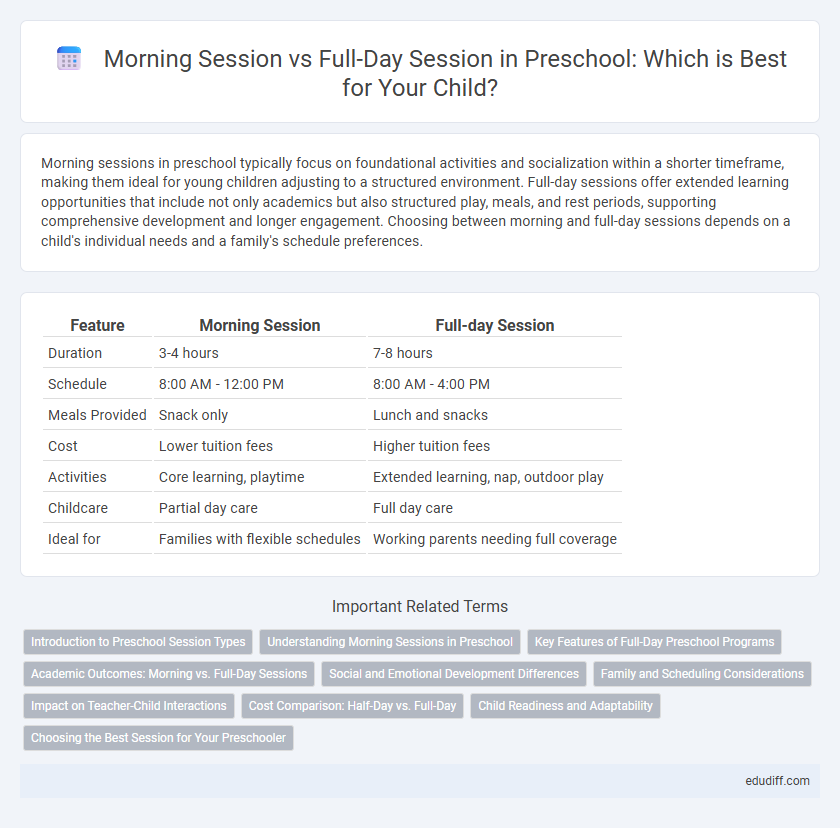Morning sessions in preschool typically focus on foundational activities and socialization within a shorter timeframe, making them ideal for young children adjusting to a structured environment. Full-day sessions offer extended learning opportunities that include not only academics but also structured play, meals, and rest periods, supporting comprehensive development and longer engagement. Choosing between morning and full-day sessions depends on a child's individual needs and a family's schedule preferences.
Table of Comparison
| Feature | Morning Session | Full-day Session |
|---|---|---|
| Duration | 3-4 hours | 7-8 hours |
| Schedule | 8:00 AM - 12:00 PM | 8:00 AM - 4:00 PM |
| Meals Provided | Snack only | Lunch and snacks |
| Cost | Lower tuition fees | Higher tuition fees |
| Activities | Core learning, playtime | Extended learning, nap, outdoor play |
| Childcare | Partial day care | Full day care |
| Ideal for | Families with flexible schedules | Working parents needing full coverage |
Introduction to Preschool Session Types
Preschool offers two main session types: morning sessions typically run for 2 to 3 hours, focusing on early learning and social skills, while full-day sessions extend up to 6 to 8 hours, integrating comprehensive activities including nap time, meals, and structured play. Morning sessions suit families seeking part-time childcare and early childhood education, whereas full-day sessions support working parents needing extensive supervision and enriched learning environments. Choosing between these depends on the child's developmental needs and the family's schedule requirements.
Understanding Morning Sessions in Preschool
Morning sessions in preschool typically last between 2 to 4 hours, designed to introduce young children to structured learning environments with activities that foster cognitive and social development. These sessions emphasize foundational skills like language acquisition, early math concepts, and fine motor coordination, often including circle time, play-based learning, and snack breaks to maintain engagement. Understanding the structure and benefits of morning sessions helps parents select programs that align with their child's attention span and developmental needs while providing a balanced start to their educational journey.
Key Features of Full-Day Preschool Programs
Full-day preschool programs provide extended learning hours, allowing children more time for social interaction, creative play, and hands-on activities that support cognitive and emotional development. These programs often include structured meal and rest times, promoting routines that help build independence and self-regulation skills. Access to enriched curriculum and diverse learning experiences in full-day sessions enhances school readiness compared to shorter morning-only sessions.
Academic Outcomes: Morning vs. Full-Day Sessions
Morning sessions in preschool typically concentrate on foundational skills such as early literacy and numeracy, promoting focused academic engagement during peak attention hours. Full-day sessions extend learning opportunities by integrating structured play, social development, and enrichment activities, resulting in broader cognitive growth and improved language acquisition. Research indicates that children attending full-day preschool programs demonstrate higher academic achievement and better school readiness compared to those in morning-only sessions.
Social and Emotional Development Differences
Morning sessions in preschool often provide children with structured social interactions and focused emotional regulation practice within a shorter timeframe, fostering early development of peer relationships and self-control. Full-day sessions offer extended opportunities for children to engage in varied social settings, allowing deeper emotional growth through prolonged play, conflict resolution, and teacher-guided reflection. Research indicates that full-day attendance supports greater emotional resilience and advanced social skills by immersing children in diverse group dynamics over an extended period.
Family and Scheduling Considerations
Choosing between morning sessions and full-day preschool programs depends heavily on family scheduling needs, work commitments, and childcare preferences. Morning sessions often suit families seeking part-time care and more flexible afternoons, while full-day sessions provide comprehensive support for working parents requiring extended hours. Evaluating factors like sibling schedules, transportation logistics, and after-school activities ensures the selected option aligns with family routines and developmental goals.
Impact on Teacher-Child Interactions
Morning sessions in preschools often provide a more focused environment for teacher-child interactions due to shorter durations and reduced fatigue, allowing educators to engage actively and attentively with each child. Full-day sessions create extended opportunities for relationship-building and comprehensive developmental support but may challenge teachers to maintain consistent interaction quality across longer hours. Research indicates that while full-day programs enhance overall learning exposure, the intensity and quality of teacher-child interactions can be higher during concise morning sessions.
Cost Comparison: Half-Day vs. Full-Day
Preschool morning sessions typically cost less than full-day sessions, making them a budget-friendly option for families seeking early childhood education. Full-day sessions provide extended care and enriched learning experiences but often come with significantly higher tuition fees reflecting additional hours and resources. Careful evaluation of cost versus educational value helps parents determine the best fit for their child's needs and family budget.
Child Readiness and Adaptability
Morning sessions in preschool promote child readiness by providing structured routines that enhance attention span and social skills within a shorter timeframe. Full-day sessions support adaptability by exposing children to diverse activities, fostering resilience, and improving emotional regulation through extended interaction and play. Research indicates that balancing both session types can optimize early childhood development outcomes in cognitive, social, and emotional domains.
Choosing the Best Session for Your Preschooler
Choosing the best session for your preschooler involves considering their attention span, energy levels, and family schedule. Morning sessions typically offer structured, focused learning ideal for younger children who thrive with shorter, consistent routines, while full-day sessions provide extended opportunities for socialization, play, and developmental activities that support holistic growth. Parents should evaluate their child's temperament and developmental needs alongside household logistics to determine the most beneficial preschool experience.
Morning session vs Full-day session Infographic

 edudiff.com
edudiff.com